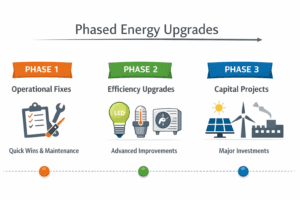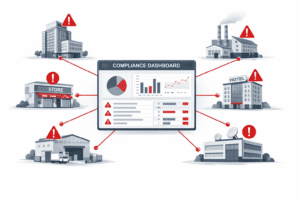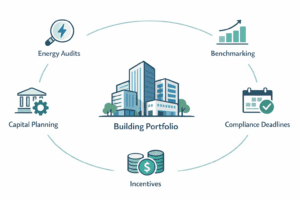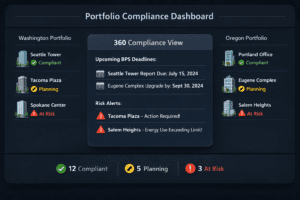I. Introduction
In today’s dynamic real estate market, property managers are increasingly facing the need to adapt to a variety of challenges, one of which is to improve the energy efficiency of their buildings. Energy benchmarking laws have become a critical aspect of sustainable property management, offering a path toward reducing energy consumption, curtailing costs, and minimizing environmental impact. This blog post delves into the intricacies and importance of energy benchmarking laws in the context of commercial property management and emphasizes why property managers need to stay well-informed about these laws.
Energy benchmarking is not merely a practice but a response to a global call for environmental sustainability—a process by which the energy performance of a building is tracked and assessed, often leading to significant operational and cost improvements. As we unpack the concept of energy benchmarking and the laws that govern it, we will explore why a strategic approach to these laws is imperative for every property manager.
II. Understanding Energy Benchmarking
A. Definition of Energy Benchmarking in the Context of Property Management
Energy benchmarking, within property management, refers to the systematic tracking of a building’s energy usage and comparing that performance to itself over time, to similar buildings, or to established industry standards. This allows managers to identify areas where energy consumption can be optimized and establishes a baseline for measuring improvements.
B. The Process of Energy Benchmarking
The benchmarking process is multifaceted and begins with the collection of detailed data regarding a property’s size, operational hours, climate zone, and energy consumption from utility bills. This information is meticulously entered into benchmarking tools such as the [ENERGY STAR Portfolio Manager](https://www.energystar.gov/portfolio-manager), where it is then analyzed. The result is a performance score that can highlight a building’s relative efficiency or inefficiency.
C. The Role of Technology in Energy Benchmarking
In the digital age, technology plays a significant role in enhancing the accuracy and efficiency of the energy benchmarking process. From sophisticated building automation systems to AI-based analytics platforms, technology enables real-time monitoring and predictive insights, which are invaluable in managing a property’s energy consumption more effectively.
III. The Legal Landscape of Energy Benchmarking
A. Explanation of Energy Benchmarking Laws
Energy Benchmarking Laws are regulations that require the annual reporting of a building’s energy consumption to encourage transparency and inform better energy management practices. They are designed to raise awareness about a building’s energy performance and to foster a competitive, efficiency-driven market.
B. Current Laws and Regulations Around Energy Benchmarking
Jurisdictions across the globe have implemented various laws to promote energy transparency. In the United States, cities like New York, Washington D.C., and Los Angeles have taken the lead, each with their own set of benchmarking requirements. These legal frameworks compel property owners to periodically measure their energy performance, a step considered fundamental in the pursuit of sustainable property management.
C. Regional Differences in Energy Benchmarking Laws
It is critical to note that energy benchmarking laws are not uniform across the board. They can vary greatly based on state, county, or city regulations. For example, California’s Title 24 imposes strict energy standards and benchmarking requirements, which differ from those of New York City’s Local Law 84. Property managers must have a clear understanding of the laws that apply to their specific locales.
IV. Why Property Managers Should Understand Energy Benchmarking Laws
A. The Legal Implications of Not Complying with Energy Benchmarking Laws
Ignoring the requirements of energy benchmarking laws can lead to significant penalties. Beyond monetary fines, non-compliance can also result in legal proceedings and a tarnished reputation among environmentally conscious tenants and stakeholders.
B. The Financial Implications of Energy Benchmarking
Energy benchmarking offers financial benefits by highlighting opportunities for reducing energy consumption, thereby lowering operational costs. It also serves as a critical datum for capital investment decisions related to energy efficiency upgrades, which can lead to rebates, incentives, and long-term cost savings.
C. The Benefits of Energy Efficiency to Property Value
Energy-efficient properties are likely to see an increase in market value. Efficient buildings appeal to tenants and investors alike, often commanding higher rents, enjoying greater occupancy rates, and exhibiting lower turnover. The U.S. Department of Energy highlights the value proposition of energy-efficient buildings, including possible higher resale values.
V. Best Practices for Energy Benchmarking
A. Developing a Comprehensive Energy Management Plan
A well-structured energy management plan is vital for effective benchmarking. It should align with organizational goals, involve stakeholders at all levels, and include clear steps for continuous improvement.
B. Implementing Energy Efficiency Measures
Property managers should not only collect and report data but actively seek ways to implement energy-saving measures. Strategies may include retrofitting lighting systems, improving HVAC operations, or adopting renewable energy sources.
C. Engaging Tenants and Stakeholders
Informing and involving tenants in energy efficiency goals can lead to collaborative efforts to reduce energy use. Communication and engagement are paramount to creating an energy-conscious community within a property.
VI. How to Keep Up with Changing Energy Laws
A. Tips on Staying Updated with Changes in Energy Laws
Staying abreast of changes means regularly reviewing policy updates, attending industry events, and maintaining memberships with professional organizations like BOMA International or the U.S. Green Building Council.
B. Resources for Understanding Energy Benchmarking Laws
Numerous resources are available to property managers, including government websites, energy efficiency networks, and certification programs like LEED. These resources offer guidance, educational materials, and updates on changing energy laws.
VII. Conclusion
Navigating the nuanced world of energy benchmarking laws is a non-negotiable component of modern property management. A comprehensive grasp of these laws not only safeguards property managers from legal risks but also unveils opportunities for financial savings and property value enhancement. As the industry continues to prioritize sustainability, those managers who commit to understanding and leveraging energy benchmarking will position themselves for success. Let this blog serve as a clarion call for property managers to deepen their knowledge of energy benchmarking and actively engage in the sustainable transformation of their managed properties.
Property managers are encouraged to embark on this journey by utilizing resources like the Building Energy Performance Standards (BEPS) and the Building Owners and Managers Association (BOMA), which provide comprehensive guides and updates on energy benchmarking and sustainability practices in property management.
VertPro.com serves as a resourceful platform for property owners and managers seeking to enhance their buildings’ energy efficiency. The site offers a range of services, including Commercial Energy Audits, Benchmark Compliance consultancy, and a Construction Marketplace. At the heart of VertPro® is a suite of SaaS technology-based solutions designed to assist in navigating the complexities of Energy Benchmarking and Energy Audits/RCx Plus, while ensuring adherence to over 60 Energy Benchmarking and Energy Efficiency Laws across the country.
For those looking to improve their property’s energy usage and operational value, VertPro.com provides a diverse array of tools and information. The site aims to facilitate a better understanding of energy efficiency practices and legislation, helping building owners and property managers make informed decisions about their energy strategies while complying with all energy ordinances and laws.

















